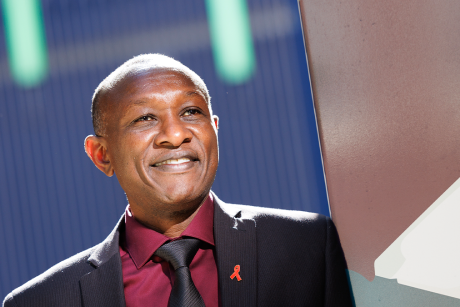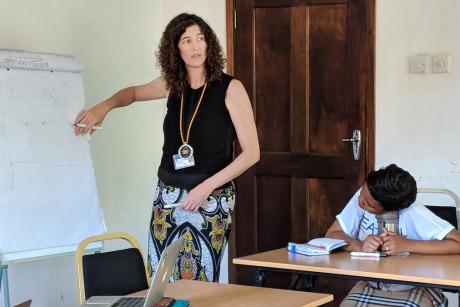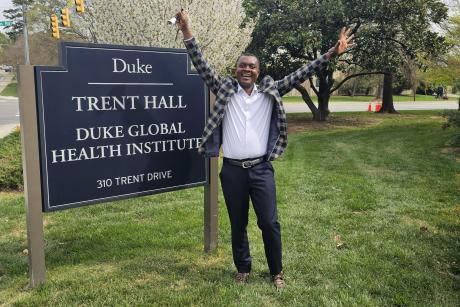
An example of the malaria parasite, similar to what we saw - Courtesy of Google Images
Published June 8, 2013, last updated on October 5, 2017 under Voices of DGHI
By: Chandra Swanson
My apologies for leaving out an introduction to our project in our first blog post - here’s our elevator speech: My name is Chandra Swanson, and I am a junior studying Evolutionary Anthropology and Global Health. My partners for the summer are Rachael Clark, a junior studying Public Policy, and Brittany Zulkiewicz, a senior studying neuroscience. Though we come from separate fields, we are all passionate about global health, which is how we got involved in the Student Research Training Program.
As part of the Student Research Training Program, we are spending the next two months in the idyllic town of Uuwo at the base of Mount Kilimanjaro. We have been working with our faculty advisor Dr. Watt over the past school year to develop two community health assessment surveys, drawn from our community’s interests. The aim of our study is to describe the knowledge, behavioral practices and attitudes regarding HPV, early pregnancy, alcohol use, and food security. Additionally, we are shadowing and volunteering at the local dispensary.
This week, we have been settling into our community in Mwika Uuwo.
The textbook definition of “pole” translates roughly to “I sympathize with you”, but in practice, pole varies as much as …. “Pole!” can mean a simple hello. Draw out the syllables and adjust your tone, and you’re saying “Ah, I’m sorry” or “Bless you”. Say it twice – “Pole, pole” and you may mean “slowly, slowly”, or “careful!”. It’s a useful multipurpose phrase that has proven particularly apt for our first week in Mwika Uuwo.
During our orientation process at Uuwo Dispensary has taken a leisurely pace. It’s involved many long conversations and several liters of tea as we rotated through the different departments – reception and records, laboratory, computer, and clinic. On our first day, we shadowed a consulting pediatrician from KCMC. As the three of us are all interested in pediatrics, we were glad for the opportunity. The first patient came in, hardly giving us a second glance. I was struck by how very willing the patients were to be observed by unknown mzungus. After the customary greetings, the Swahili flowed too quickly for me to follow, and I sat back to make faces at the accompanying child. After a few minutes, the doctor turned to us and summed up the case, then said expectantly, “So, what do you think? What questions do you want to ask?” It was quite the jolt for our first day. Amongst the three of us, we are able to come up with some valid questions.
We learned how to check for anemia, and the proper methods for listening for respiratory infections - the bad raspy breathing got the ironically poetic description of wind rushing through tall grass. While most patients were referred to KCMC for further tests, some cases were resolved. One very interesting case involved a young girl who had been experiencing frequent seizures. Not only was the illness complex, but the parents’ response to the doctor’s referral for an EEG at KCMC. They said that they had been praying and only wanted to continue praying. What caught my attention though, was how the doctor handled the situation. Essentially, she suggested that they had been brought here on this specific day that she happened to be the visiting doctor, their prayers had been answered, and now the best they could do would be to listen to her advice. Her words were convincing and assertive, without belittling the parents’ beliefs. This was one instance of the interesting intersections of faith and medicine we have seen at this clinic, given that it is directly connected to the local Lutheran church.
Though we met the staff in their individual departments, they all shared this great for their work. As they explained their jobs, “pole pole” did not apply – we jumped right into the process. Whether it was the mortician, who briefly demonstrated how to prepare a dead body, the receptionist, who was so very proud of us when we successfully admitted a patient (working with multiple insurances and paper forms was surprisingly complex), it was impossible not to share in the excitement. For instance, in the laboratory, the head pathologist showed us malaria and tuberculosis. From my studies I know that malaria figures greatly into the burden of disease, one of the big 5 for disease in East Africa. It was different somehow, there in the clinic. There, as I peered through the microscope at the burst shell of a red blood cell, overshadowed by a large blue loop punctuated by a bright red dot (that’s the parasite), the pathologist was saying, “Yes, now this is one of the kinds that kills millions of our children”.
Now that we’ve become acquainted with the ins and outs of the dispensary proceedings, we are looking forward to exploring Uuwo on our household visits. As one of our main topics for exploration is alcohol use, we’ve been intrigued by the plethora of alcohol packets lining the roads in our brief hikes around our home. Our host mom, Mama Nancy, calls them Tanzania’s flowers. Hopefully our surveys will be able to increase our understanding. We’re taking around 1000 pages of paper back to Mwika Uuwo today, so the surveys will be rolling out next week!


